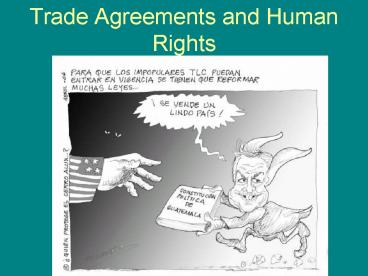Trade Agreements and Human Rights
1 / 14
Title:
Trade Agreements and Human Rights
Description:
Trade sanctions can (arguably) be a means of enforcing human rights ... Establish institutions that circumvent democratic checks and balances ... – PowerPoint PPT presentation
Number of Views:55
Avg rating:3.0/5.0
Title: Trade Agreements and Human Rights
1
Trade Agreements and Human Rights
2
Why is trade a human rights issue?
- Trade sanctions can (arguably) be a means of
enforcing human rights - Yet embargos often can contribute to violations
of rights, too (e.g., Cuba) - Trade and investment flows affect the economy,
can provide solutions for human rights challenges - Structure of trade relations determines who
benefits how is trade conducted? - Free trade is a loaded term
3
Does free trade benefit human rights?
- Free trade removal of tariffs and barriers and
other market distortions - In theory, this should produce
- Reduced prices
- Wider consumer choices
- How does this mesh with human rights reality?
- In practice, a lot of what gets called free trade
is not - Bottom line look beyond the label free trade
to actual policies - Should everything be a commodity?
4
Trade Agreements in the Americas
- NAFTA 1994
- US- Chile 2003
- CAFTA 2005
- US- Peru 2007
- Agreements with Colombia, Panama (yet to be
ratified) - FTAA originally scheduled for January 1, 2005
stalled
5
Trade Agreements in the Americas
- Human rights concerns
- Lack of parity (e.g., agricultural subsidies) gt
dumping - Facilitate development model that creates jobs
and economic growth, but at what cost? Who
benefits? - Concerns about labor, environment
- Establish institutions that circumvent democratic
checks and balances - Investor-state arbitration (Chapter 11 of NAFTA,
Chapter 10 of CAFTA)
6
Free Trade, Intellectual Property, and Human
Rights
7
Intellectual property
- Why is this a human rights issue?
- History of IP
- WTO TRIPS Agreement 1994
- Doha Declaration 2001
- TRIPS-plus provisions in free trade agreements
began after Doha
8
What are TRIPS-plus IP provisions?
- Extension of patents
- Test data exclusivity
- _______________________________
- Longer periods of market monopoly
9
HIV/AIDS in CAFTA countries
- Prior to CAFTA 1 in 6 people who need
antiretrovirals received them - Generic treatment 230 per patient, per year
- Brand-name drugs 2,000-2,500 per patient, per
year
10
Edgar
11
Who opposes IP rights in FTAs?
- Amnesty International
- Oxfam
- Doctors without Borders
- World Health Organization
- 11 members of US Congress in January 2005 The
test data secrecy/market exclusivity rules will
slow the introduction of generic drugs, decrease
competition, raise prices, and hinder access to
life-saving medicines in the DR-CAFTA countries.
- 13 members of US Congress in November 2005
- Ministers of health in 10 South American
countries in May 2006
12
What do defenders of TRIPS-plus say to such
critiques?
- USTR CAFTA expressly states that nothing in the
agreement will affect a countrys ability to take
measures necessary to protect public health. - Argument that CAFTA/AFTA increase access by
encouraging major pharmaceuticals to register
drugs in small markets
13
Whats at stake?
14
Their lives are not for sale































